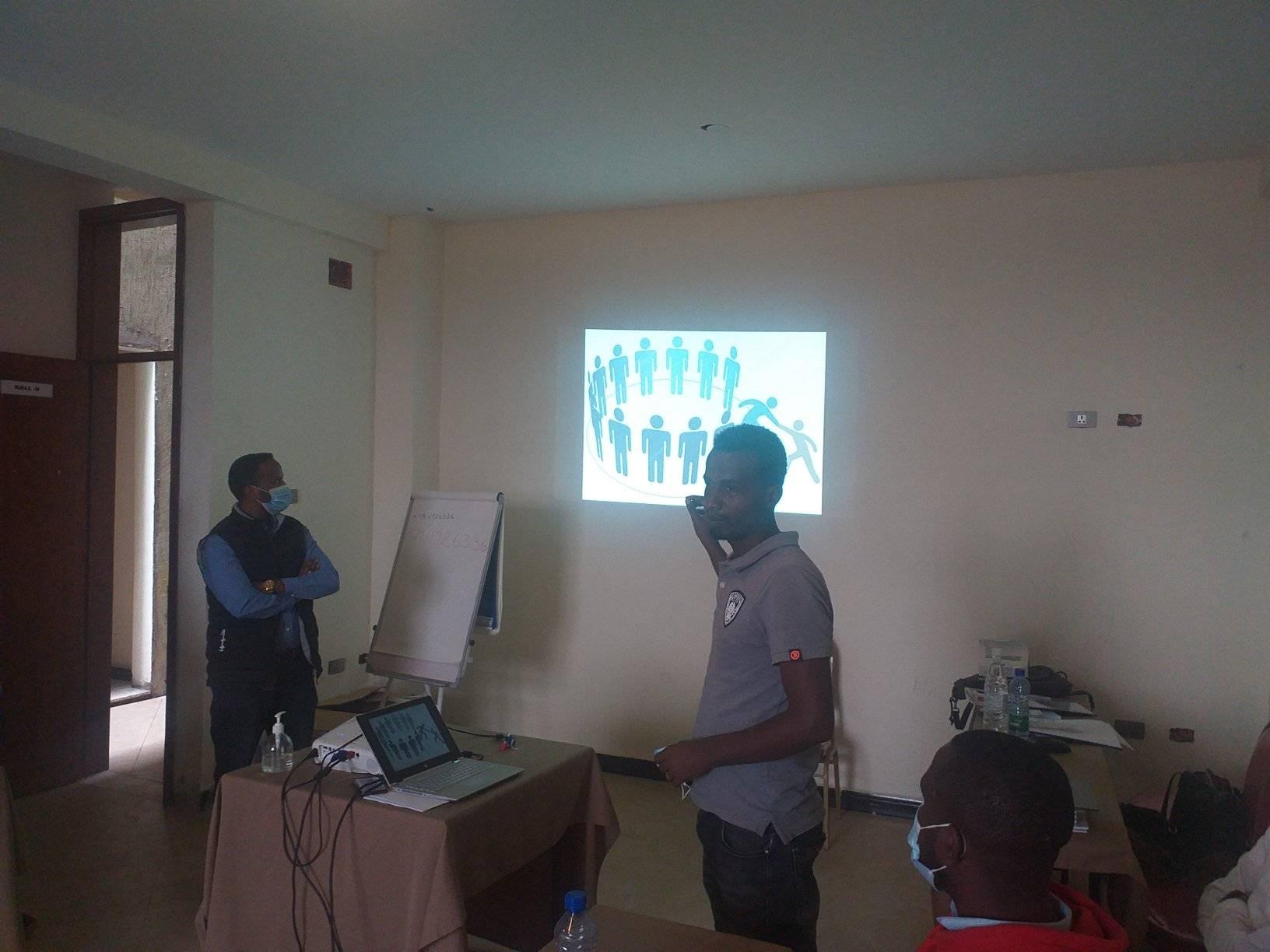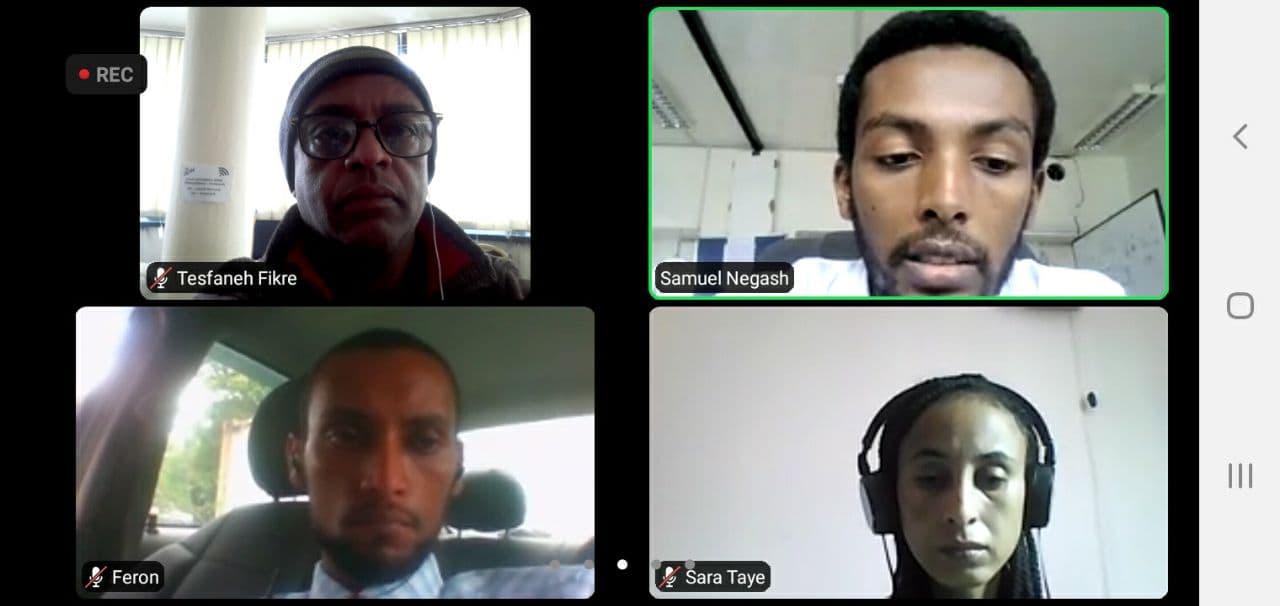 The above picture was randomly selected from Google by one of the participants at the Providers Share Workshop conducted in Adama from July 9 to 11, 2021. The picture was selected by the participant in response to an activity challenge posed by Dr. Tesfaye Hurisa, one of the trainers on the workshop. Dr. Tesfaye challenged the participants to google a random picture in a couple of minutes that they would think show best how they feel about safe abortion care.
The above picture was randomly selected from Google by one of the participants at the Providers Share Workshop conducted in Adama from July 9 to 11, 2021. The picture was selected by the participant in response to an activity challenge posed by Dr. Tesfaye Hurisa, one of the trainers on the workshop. Dr. Tesfaye challenged the participants to google a random picture in a couple of minutes that they would think show best how they feel about safe abortion care.
Shown in the picture are individuals in a circle and one person falling out of the circle while another in the earlier group lending hand to bring him back into the group. The participant explained the picture as one that shows how safe abortion care providers go out of the traditional norm to provide the service, and how they should be given a supporting hand for the lives they are saving which would have been lost otherwise. Other pictures selected by participants to represent how they feel about the service they are providing were quite remarkable.
Traditional and religious values influencing the practice of safe abortion care are typical to most places in Ethiopia despite the relatively safer legal support the country provides to the service. Health care workers who provide the service are stigmatized both by the community they are serving and their colleagues.
“Whether we provide the service only impacts how safe the abortion is; it does not affect the prevalence of the practice in any way,” Dr. Ferid Abas, Dr. Tesfaye Hurisa, and Dr. Lemi Belay strongly argue during the workshop.
The aim of the workshop was to create a safe environment and platform for the health care providers to share experiences free of judgment and stigma they face in their daily engagements. The participants shared a lot indeed. The workshop also involved a roleplay wherein participants played an imaginary story of woman who seeks the service and a health care worker who refuses to provide the service and fails to provide the appropriate counseling service.
The workshop was organized by the Ethiopian Society of Obstetricians and Gynecologists (ESOG) under its project- Strengthening Capacity and Improving Quality of Reproductive Health (Family Planning (FP) and Comprehensive Abortion Care (CAC)) and Reducing Stigma on Abortion Care Service Providers. The overall objective of the project is to improve the quality of FP and CAC in the primary health care units to increase service uptake and support the Ministry of Health (MoH) in developing effective de-stigmatization strategies for safe abortion care among health care workers. To achieve this end, the project aims at institutionalizing FP and CAC and newborn health mentorship programs at primary hospitals and health centers through producing Emergency Surgical Officers (ESOs). Strengthening the quality improvement programs in FP, CAC, maternal and child health at primary hospitals and health centers, and reducing stigma and discrimination against abortion care providers are also the objectives of the project.
Funded by the David and Lucile Packard Foundation and partnering with MoH, regional health bureaus, woreda health offices, hospitals, and health centers, the project will run until July 31, 2021.
 Virtual training for data collectors has been underway beginning July 19, 2021, for two weeks to end on July 30, 2021. Attending the training were about 50 participants from 10 hospitals from four regions of the country.
Virtual training for data collectors has been underway beginning July 19, 2021, for two weeks to end on July 30, 2021. Attending the training were about 50 participants from 10 hospitals from four regions of the country. The above picture was randomly selected from Google by one of the participants at the Providers Share Workshop conducted in Adama from July 9 to 11, 2021. The picture was selected by the participant in response to an activity challenge posed by Dr. Tesfaye Hurisa, one of the trainers on the workshop. Dr. Tesfaye challenged the participants to google a random picture in a couple of minutes that they would think show best how they feel about safe abortion care.
The above picture was randomly selected from Google by one of the participants at the Providers Share Workshop conducted in Adama from July 9 to 11, 2021. The picture was selected by the participant in response to an activity challenge posed by Dr. Tesfaye Hurisa, one of the trainers on the workshop. Dr. Tesfaye challenged the participants to google a random picture in a couple of minutes that they would think show best how they feel about safe abortion care.
